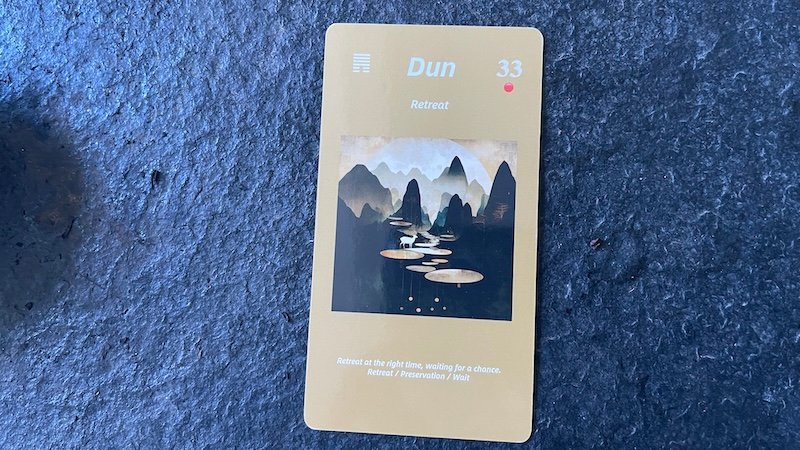
Should I Let My Sister Pay for My Broken Kindle? (Hexagram 33)
- By YOWAYOW
A few days ago, I received a brand-new Kindle from my father—a gift I’d been wishing for and finally got. It meant a lot to me.
Then, while I was at work, my sister and her 4-year-old son came to visit. I still live with my parents, and without asking, they let him into my room. When I got home, I noticed things were out of place. That’s when I found the Kindle—scratched on the screen and the sides. I was furious.
This wasn’t just some accident. This kid has a history of breaking my stuff—he once threw my phone onto concrete in front of me—and never seems to face consequences. Worse, when confronted, he laughs about it, like he knows no one’s going to stop him.
My sister was upset too and offered to buy me a new Kindle. She didn’t blame me, though she did mention I probably shouldn’t have left it out. The thing is—she and her husband are struggling financially. He’s unemployed, and she’s doing her best to hold everything together. So, I feel incredibly guilty accepting money from her, even though it’s technically fair.
At first, the Kindle didn’t work. It froze and didn’t respond. But after a forced restart, it seems okay—though I don’t know what damage it might have taken from how her son handled it. Maybe it’ll break down later. Maybe not. I’ve already ordered a new one (she hasn’t paid me yet), and now I’m unsure what to do.
Do I cancel the order and just live with the scratches?
Do I keep the new one and give her the damaged one, saying I “repaired” it?
Or do I just take the hit and not ask for a cent?
It’s just $120. But it feels like more than money is on the line here.
The Answer: Hexagram 33 — Retreat (遁卦)
In response to this emotional situation, the I Ching offers Hexagram 33 – Retreat (遁) as guidance.
Meaning of Hexagram 33
Hexagram 33, composed of Heaven (☰) below and Mountain (☶) above, speaks of a time when direct confrontation is unwise. The wise person knows when to withdraw, not out of fear, but to preserve energy, dignity, and long-term peace.
It teaches us:
“Step back—not to lose, but to protect your values until the time is right to act.”
This isn’t about surrender. It’s about strategic retreat, emotional clarity, and creating boundaries with grace.
How This Applies to Your Story
This situation is not just about a Kindle—it’s about boundaries, respect, and your place in the family. Hexagram 33 advises you to avoid direct conflict, especially since your sister is already overwhelmed.
✦ Don’t make her pay — but don’t let this pass quietly.
Refusing the money is an act of compassion, but only if you also express your limits clearly. The true damage here isn’t to your Kindle; it’s to your space and peace of mind.
Instead of demanding repayment:
- Let her know kindly but firmly that your space and things must be respected.
- Tell her this isn’t just about the Kindle—it’s been happening too often.
This way, you “retreat” from financial confrontation but “stand your ground” emotionally and personally.
Three Options Compared
| Option | Wisdom of Retreat? | Moral Cost | Relationship Cost | Long-Term Effect |
|---|---|---|---|---|
| Keep the old Kindle, cancel the new | ✅ Wise retreat | ✅ You take the loss | ❌ No boundaries set | ⚠️ May repeat |
| Ask her to pay | ❌ Direct clash | ❌ Guilt & burden | ⚠️ Strains family | ✅ Fair, but costly |
| Buy new Kindle yourself, set boundaries | ✅ Strategic retreat | ✅ Emotional balance | ✅ Relationship safe | ✅ Sustainable solution |
Best Path: Buy your new Kindle, but make it clear this cannot happen again. You’re not demanding money—you’re demanding respect.
Final Insight from the I Ching
“True strength is knowing when to stand firm, and when to step back with dignity.”
In this case, the I Ching encourages you to rise above the chaos. Let the money go. But don’t let the lesson go unspoken.
Boundaries, not compensation, are what truly need to be restored.
FAQ
Q: Is Hexagram 33 about giving up?
No. It’s about knowing when not to waste energy on battles that won’t change the outcome. It’s tactical wisdom, not passive surrender.
Q: What if this happens again?
Then it’s time to move beyond retreat and into boundary enforcement. But the first step is a peaceful stance with clear limits.
Q: Does this mean I always have to “let it go” in family matters?
Absolutely not. It means choosing your battles—and protecting the relationship when it still has value.
Want to explore more cards?
See the full list of I Ching Hexagrams →
All predictions and interpretations on this site are purely for entertainment purposes and should not be taken seriously.
If you have a personal question or dilemma, you’re welcome to submit it.
We choose a few questions to respond to from time to time. Some of these may be featured on our blog, anonymously.
Please note:
Not every question will receive a response.
There is no cost to submit a question.
Responses are intended to inspire reflection, not provide absolute answers.
If selected, your question may be shared on the site, without any identifying information.
Submit your question via email: ask@yowayow.com
By submitting, you agree that your question may be used for public exploration on our site, anonymously and respectfully.